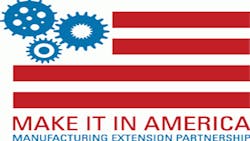We'll Help You 'Make it in America' Says Congress
The Make It In America plan for the 113th Congress is focused on four key priorities that can bring about the changes needed to help businesses grow and create jobs here, according to Congressman Steny H. Hoyer of Maryland. “These priorities are central to helping manufacturers produce more goods here, maintaining America’s innovation edge, and preparing a highly skilled workforce,” Hoyer says on his website explaining the importance of the plan.
Eleven “Make It In America” bills have been signed into law during the 113the. The objective of these laws is to help manufacturers keep and create good jobs in the U.S. The law addresses the issue in a variety of ways:
- U.S. Manufacturing Enhancement Act: Makes it cheaper for American companies to obtain the materials they need to manufacture goods. [Public Law 111-227]
- Protecting American Patents: Helps the Patent Office to begin to unclog the backlog—totaling about 1.2 million pending applications—by giving the agency access to more of the fees it collects so that patent applications can continue to be processed and innovative ideas can continue to move to market. [Public Law 111-224]
- Preventing Outsourcing: Prevents the outsourcing of U.S. jobs by closing tax loopholes that encourage companies to send U.S. jobs overseas. [Public Law 111-226]
- Small Business Jobs Act: Expands lending to millions of small businesses and offers tax incentives to help small businesses grow, hire, and fuel our economy, without adding a dime to the deficit. [Public Law 111-240]
- Small Business Jobs Act: Expands lending to millions of small businesses and offers tax incentives to help small businesses grow, hire, and fuel our economy. [Public Law 111-240]
- America COMPETES Reauthorization Act: Establishes innovative technology federal loan guarantees for small- and medium-sized manufacturers and invests in science, technology, engineering, and math education. [Public Law 111-358]
- Reauthorization of Small Business Innovation Research (SBIR) and Small Business Technology Transfer (STTR) programs: The six-year reauthorization ensures that the nation’s small, high-tech, and innovative businesses are a significant part of the federal government’s research and development efforts. [Public Law 112-81]
- Leahy-Smith America Invents Act: Improves the patent system to provide incentives for companies to continue innovating and manufacturing in the U.S. [Public Law 112-29]
- Export-Import Bank Reauthorization Act: Reauthorizes the Export-Import Bank for three years, ending uncertainty for businesses and providing the resources needed to keep American exporters competitive. [Public Law 112-122]
- Surface Transportation Reauthorization: Funds infrastructure improvements that will support manufacturing, spur economic growth, and create jobs in our communities. [Public Law 112-141]
- Workforce Innovation and Opportunity Act: Reauthorizes the Workforce Investment Act in a way that ensures that adults, youth, dislocated workers and people with disabilities can receive the assistance they need to succeed in the job market, helps workers obtain jobs and build careers through strategic partnerships, and enables businesses to identify and hire qualified personnel to grow and continue our economic recovery.
Source: Rep. Steny Hoyer (D-5th, Md.)
